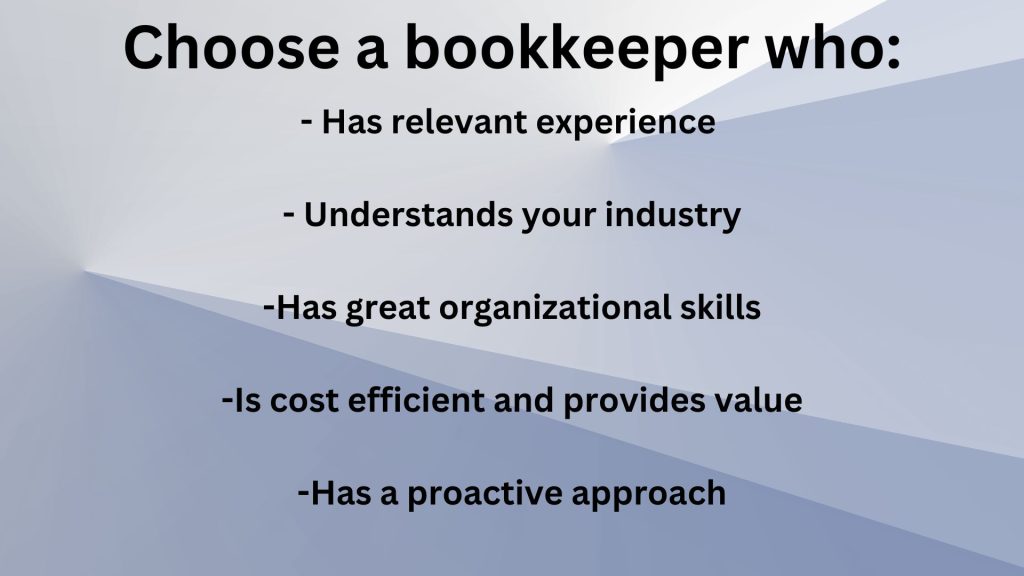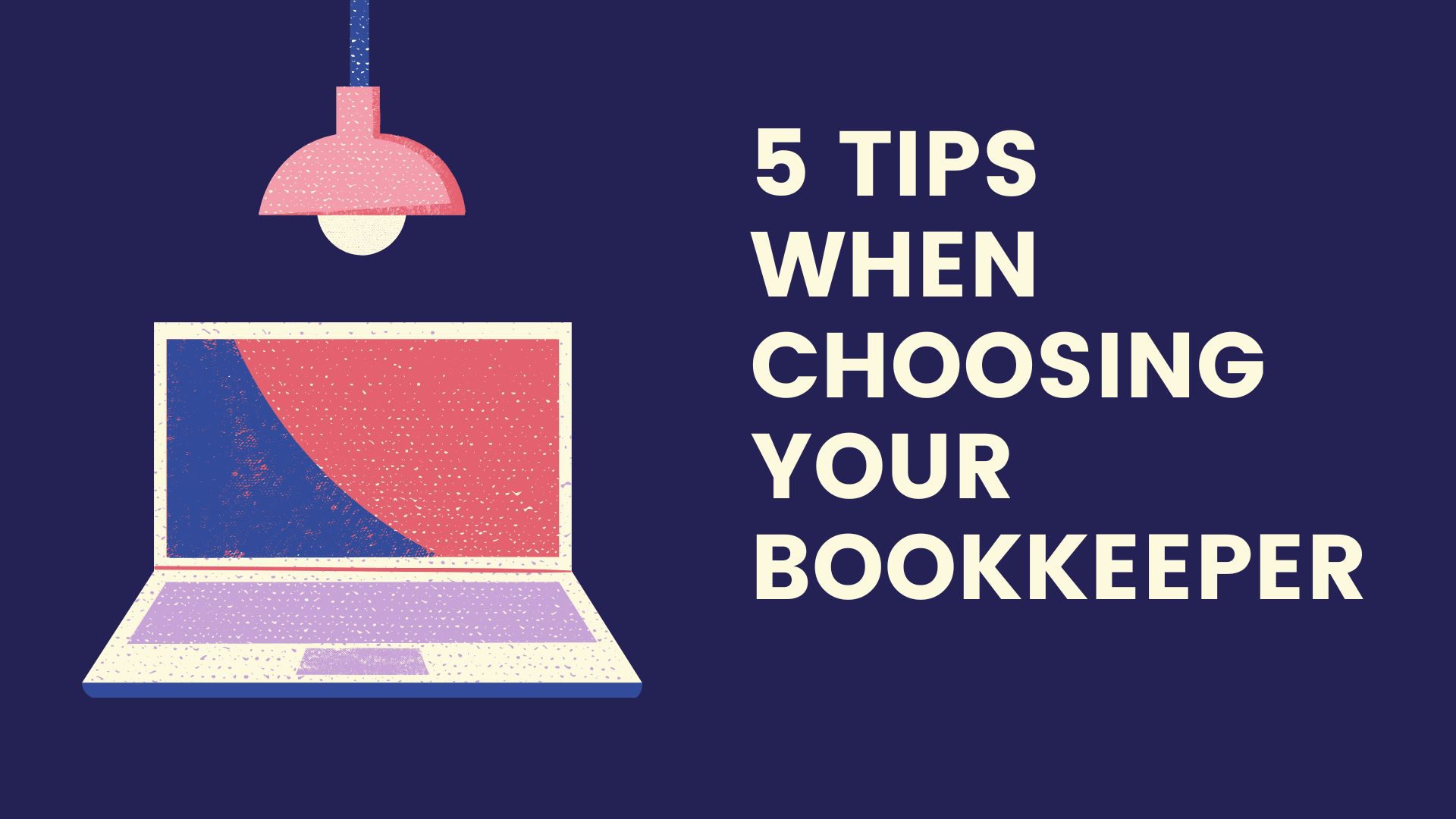Choosing the right bookkeeper is crucial for any business. A good bookkeeper helps keep your financial records in order, which can save you time and money. They also provide valuable insights that can help your business grow. Here are five tips to consider when choosing a bookkeeper.
1. Relevant Experience
When choosing a bookkeeper, relevant experience is crucial. A bookkeeper with experience in a business similar to yours can be the glue that holds your organization together. They should have worked in a company of similar size and complexity. For instance, the needs of a high-growth startup are very different from those of a long-established construction company.
An experienced bookkeeper understands the importance of accurate bookkeeping for small businesses. This includes maintaining financial health, aiding in informed decision-making, and ensuring smooth tax preparation. Here are some areas where experience is essential:
- Monthly bank and credit card reconciliations
- Managing accounts payable and receivable
- Payroll processing and management
- Conducting worker’s comp audits
- Handling sales tax and use tax returns and audits
- Preparing year-end financial reports for tax season
A seasoned bookkeeper can provide valuable insights and suggestions for increasing your revenue. They know the financial strategies that work best with your customer base.
Don’t hesitate to ask about their training and real-world experience. Certifications can also be a good indicator of their expertise. By ensuring your bookkeeper has the right experience, you set your business up for success.
2. Industry Knowledge
When choosing a bookkeeper, it’s crucial to consider their industry knowledge. Every business is unique, and having a bookkeeper who understands the specific challenges and nuances of your industry can make a significant difference.
A bookkeeper familiar with your industry will already know the common issues and how to handle them. This means they can provide better insights and more accurate financial records, reports, and insights. They can also help you stay compliant with industry-specific regulations.
If your bookkeeper is unfamiliar with your industry, there will be a steep learning curve. It’s a good idea to ask if they have worked with other clients in your field and to provide examples of how they have handled industry-specific challenges.
Additionally, if you use specific software for your business accounting needs, you’ll want someone experienced with that software. This ensures they can hit the ground running and manage your books efficiently.
3. Organizational Skills
When figuring out how to choose your bookkeeper, one of the most important things to look for is their organizational skills. A good bookkeeper will set up and keep a system that makes it easy to record and sort financial transactions. They make sure all documents, receipts, and records are stored in a way that makes sense and is easy to get to.
Why Organization Matters
Being organized helps bookkeepers find information quickly, which is super helpful during audits or when doing financial analysis. It also means they can keep everything up to date, so you always know where your business stands. A healthy profit/loss and balance sheet statement leads to better and clearer tax strategies, which in turn result in exploring unique areas of tax savings.
As a result a good bookkeeper will save you a lot of money. For example, at Taxfully we help our clients save between $6200 to $12500 more in taxes per year, compared to LLC owners without proper bookkeeping and healthy financial statements.
Tools and Techniques
Many bookkeepers use cloud-based systems to keep accounts current. These systems help business owners spot issues faster, make better decisions, and help the business grow.
Key Tasks
- Collecting employee work time and paying wages
- Managing benefits and deductions
- Completing monthly, quarterly, and end-of-year financial reports
A well-organized bookkeeper can make a big difference in how smoothly your business runs.
When thinking about how to pick a bookkeeper, remember that their ability to stay organized can save you time and stress. So, keep these tips for choosing a bookkeeper in mind to make the best choice for your business.
4. Cost Efficiency
When choosing a bookkeeper, cost efficiency is a crucial factor. You want to ensure that the services provided are worth the investment. Here are some points to consider:
- Budget: Different bookkeepers and services come with varying costs. Assess your bookkeeping needs and decide on the type of service that fits your budget.
- Vendor Reduction: Having fewer vendors can save time and resources. If you have separate bookkeepers and tax professionals, coordination can become a hassle.
- Value Addition: A good bookkeeper can offer more than just basic services. They can provide insights into your financial health and help you make informed decisions.
While hiring a bookkeeper means spending money, ultimately, you will realize a financial benefit. Competent bookkeepers understand their client’s financial landscape and tailor their services to meet unique needs.
5. Proactive Approach
When selecting a bookkeeper, it’s crucial to find someone who takes a proactive approach rather than just focusing on reactive compliance tasks. A proactive bookkeeper will actively engage with your business throughout the year, offering insights and strategies to help you save money, reduce taxes, and streamline operations.
A proactive bookkeeper will:
- Help you reduce and mitigate your taxes
- Streamline your operations
- Ensure your financials are pristine
- Develop a process and roadmap to achieve both short-term and long-term goals
- Implement standard operating procedures to help scale your business
Look for a bookkeeper with leadership and vision to guide your business toward a successful future.
Conclusion
Choosing the right bookkeeper is a big step for your business. A good bookkeeper will not only keep your financial records in order but also help you make smart money decisions. Remember to look for someone with the right experience, who understands your business, and who can save you money. Taking the time to find the right person will pay off in the long run. Your business will run smoother, and you’ll have more time to focus on what you do best. So, take these tips to heart and find a bookkeeper who can be a true partner in your business success.





